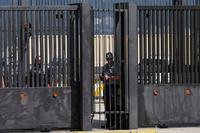The U.S. military's top officer expressed concern Wednesday over a Defense Department plan to cut nearly 13,000 military health jobs, saying the reductions could leave the medical forces short during wartime.
Testifying as part of a House hearing on the DoD budget Wednesday, Chairman of the Joint Chiefs Gen. Mark Milley said the proposed cuts -- an element of larger health reform initiatives at the DoD -- are "OK on a day-to-day basis" when providers are in protected hospital settings, but they could be a significant challenge with troops in harm’s way.
Milley raised questions over whether there would be a sufficient number of doctors, nurses, corpsmen and medics to man combat hospitals and fighting units.
Read Next: Soldier Killed in Bear Attack on Alaska Military Base
"Candidly, I do have concerns," Milley said. "[Medical readiness is] a very challenging subset of our overall military personnel challenges, but one, in particular, that causes great attention because in time of war, as we all know, there'll be significant casualties. In peacetime, you're manning these treatment facilities ... but in wartime, they're going to go forward, and that is where the readiness issues will show up."
Congress authorized the DoD in 2017 to revamp its medical system, with an aim to curb the rising costs of providing medical care for 9.6 million service members, military retirees and their families.
Under the plan, the DoD's Defense Health Agency is to operate the health care system, including running military hospitals and clinics and providing care to non-military beneficiaries. Service medical commands will focus on caring for U.S. troops in DHA facilities and deployment settings, including combat, and training medical personnel for operations.
As part of the plan, the military services are expected to cut roughly 12,800 military health billets, and the Defense Health Agency will downsize or close 50 health facilities.
The reductions were placed on hold during the pandemic, but DHA officials said earlier this year that they would proceed with the reforms this year.
Some hospitals and clinics have begun feeling the pinch of the reductions, having let positions that are expected to be eliminated go unfilled as troops leave the service or depart for another duty station.
Lawmakers whose districts will be affected by the changes have raised concerns over the reforms, which they say already are affecting medical care.
Rep. Derek Kilmer, D-Wash., said in May 2021 that the staff at Naval Hospital Bremerton had been reduced by more than 100 billets in the previous year, causing patients to "lose access to quality care."
"The realignment is not only affecting the military hospital in my region, but is affecting many other districts across the country as well," Kilmer said during a hearing on the military health system. "When hospital staff leave, either because they retire or move to another installation, their positions are no longer being filled."
Following reporting from Military.com, Rep. Greg Murphy, R-N.C., wrote a letter to Defense Health Agency Director Lt. Gen. Ronald Place on April 6 asking him to look into servicewomen and military spouses facing challenges getting timely appointments for maternity care in the area surrounding Camp Lejeune, North Carolina, as a result of a shortage of providers at the naval hospital on base.
"This issue may not be just one that my district is experiencing but may be systemic to all military hospitals due to reforms DHA is leading to cut costs across the system," Murphy wrote. "Military dependents are being forced to find private physicians to care for them. In the case of Jacksonville, for example, there may not be enough OB/GYNS to care for our expectant mothers."
The Defense Department's proposed fiscal 2023 budget calls for $54 billion for the military health system, a nearly 8% increase from the start of the pandemic.
During the hearing Wednesday, members of the House Appropriations Defense Subcommittee did not comment on the medical budget request, nor did the representative who asked the question -- Arizona Democrat Rep. Ann Kirkpatrick, whose district includes Fort Huachuca and Davis-Monthan Air Force Base -- give Milley any feedback.
Rep. Betty McCollum, D-Minn., the subcommittee chairwoman, did promise to hold a hearing specifically on the military health system.
-- Patricia Kime can be reached at Patricia.Kime@Military.com. Follow her on Twitter @patriciakime
-- Rebecca Kheel can be reached at Rebecca.Kheel@Military.com. Follow her on Twitter @reporterkheel.
Related: Here's the List of Military Clinics That Will No Longer Serve Retirees, Families














